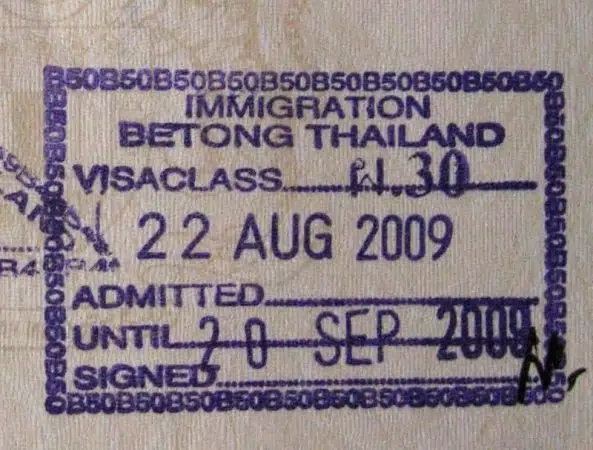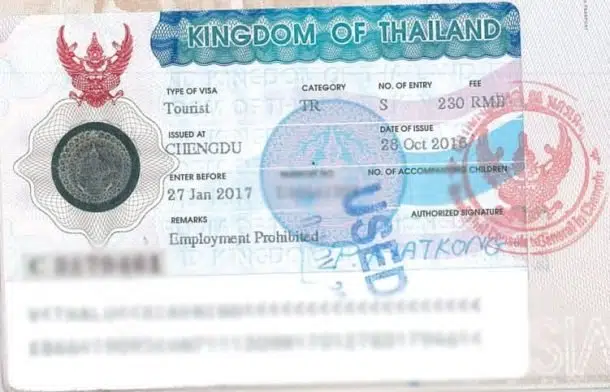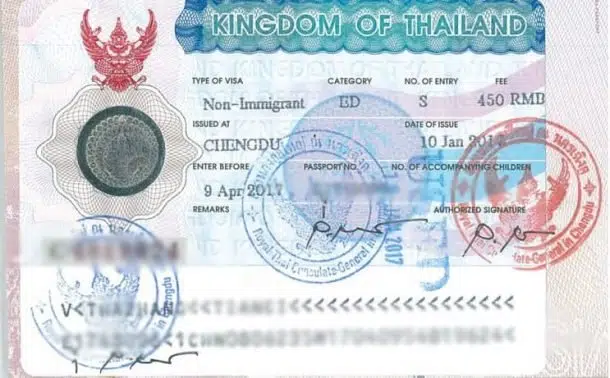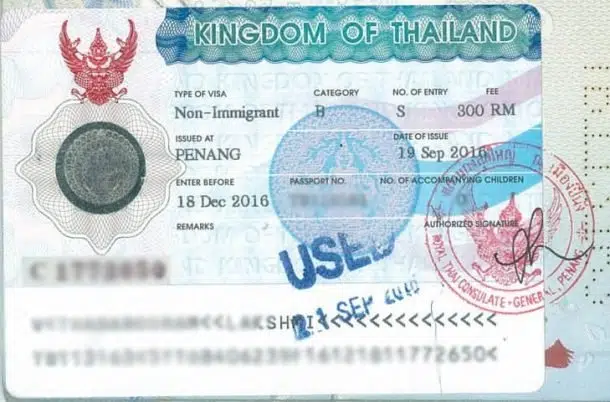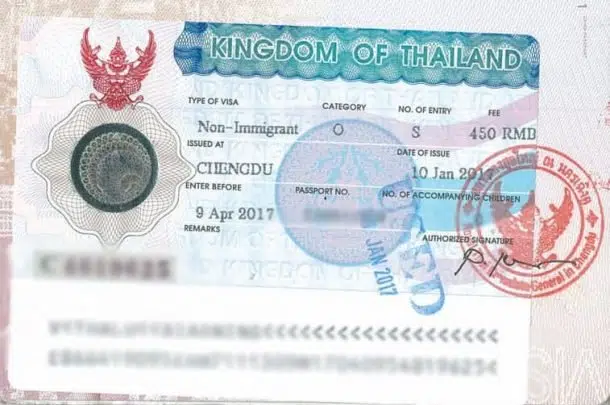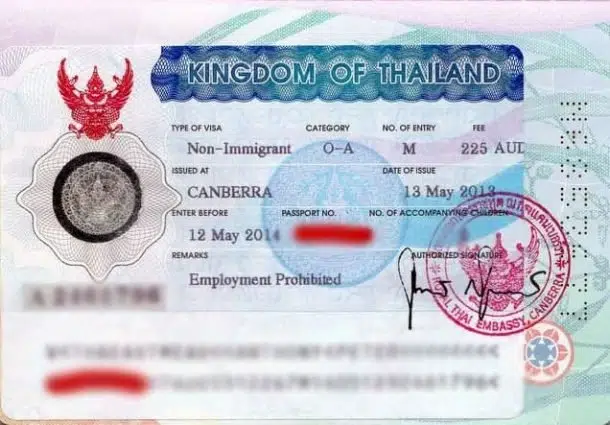Note: for SEE TEFL Trainees, see our Thai Visa Guide for TEFL Trainees with specific recommendations and how SEE TEFL can assist with a Thai Visa.
Below is a Comprehensive Thai Visa Guide for the kinds of visas and visa exemptions, work permits, and immigration issues in Thailand, especially for English teachers.
Visa Requirements for Foreigners in Thailand
Any foreign national who wishes to live and work in Thailand must successfully apply for a visa from a Thai embassy or consulate abroad. Foreigners visiting, touring, studying, retiring or seeking employment in Thailand must all apply for one of a variety of tourist and non-immigrant visas. In this case, non-immigrant draws attention to the fact that the situation is temporary. This is not to be confused with permanent residency, which requires a minimum of five years of living in Thailand.
The most popular visa categories available to foreigners planning to visit Thailand include:
- Tourist visa (TR)
- Multiple Entry Tourist Visa (METV)
- Medical Treatment (MT) (Medical Tourism)
- Transit visa (TS)
- Education visa (ED)
- Business visa (B)
- Dependent, Family visa (O)
- Volunteering (O)
- Retirement visa (O-A)
Any visa or visa-exempt permission to stay allows for enrolling in a TEFL training, Thai language, or any other kind of course. For employment, only a Business visa (B) or an O-Other visa (for reason of family or volunteering) will qualify for a work permit as an add-on, which is a requirement for any foreign national to work in Thailand. There is also a visa-exempt permission to stay which acts somewhat like a visa-on-arrival, and is available at many land borders and airports.
In reality there are quite a few specific visa categories and types, including:
- Diplomatic visa (D)
- Expert or specialist visa (EX)
- Official duties (military exercises or government appointments) (F)
- Investment (IB, IM)
- Media (M)
- Religious activities (R)
- Research/scientific (RS)
- Sports (S), which is actually a form of the Transit Visa
- Crew/Conveyance (C), which is also a form of the Transit Visa for those operating vehicles/aircraft/watercraft that enter Thailand
And last but not least there is the Thailand Elite/Privilege Entry (PE) five year visa for the well-heeled.1
> Non-Immigrant is a precursor to many of the visas types, and is abbreviated as Non- as in Non-immigrant B Business Visa aka Non-B. In reality this is just a shorthand way of referring to the same kind of visa. Every B visa is in reality a Non-B aka Non-Immigrant B visa. When people say O visa or Non-O visa they mean the same thing.
How to Apply for a Visa to Thailand
A visa to Thailand is a physical sticker affixed to a page in the passport. Applying for a visa requires meeting certain criteria and presenting supporting documents, which vary depending on the type of visa but include everything from financial statements and travel-booking receipts to letters of request from a prospective employer or training institute.
Applications for visas to Thailand can be submitted to any Thai embassy or consulate in the world (regardless of the applicant’s nationality). Application fees vary and, of course, are always subject to change.2 As of late 2015, the application fee for tourist visas is 1,000 THB (60-days), and 5,000 THB (6-month Multiple Entry). The application fees for other visas classes mentioned in this chapter are 2,000 THB for a 90-day (single-entry) visa and 5,000 THB for a one-year (multiple-entry) visa. All visa application fees are non-refundable. These fees may be different at Thai consulates which accept fees in local currencies.
Extending a Visa in Thailand
While a visa is applied for outside of the country, most can be extended inside the country by visiting an immigration office. For example, a person who has visited the country on a 30-day visa exemption may be able to add an additional 30 days to their stay without leaving the country. Likewise, holders of 60-day tourist visas are generally allowed to purchase an additional 30-day extension through a local immigration office in Thailand. And as virtually any English teacher in Thailand can attest, the initial 90-day business visa that allowed them to seek employment and ultimately request a work permit can eventually be extended to match the life of the work permit.
To extend their current visa, a person need only visit the nearest Thai immigration office.3 In most cases, the fee for an extension is 1,900 THB.
Visa Options for TEFL Trainees
For those planning to enroll in a TEFL training course in Thailand, the type of visa to apply for depends largely on whether the individual has already enrolled in a course before travelling to Thailand. TEFL providers may offer visa assistance. The following visa categories are all potentially good fits for those interested in completing a TEFL course:
Thailand Visa-Exempt Permission to Stay
This is actually not a visa, though it remains one of the most common ways for tourists to enter the Kingdom of Thailand. Some national governments have made arrangements with Thailand so that their citizens can travel within the country without a visa. There are currently 48 countries (as of 2015) whose citizens qualify for visa exempt status.4
As of 2015, the following countries are eligible for Visa-Exempt Permission to Stay: Argentina (90 days), Australia, Austria, Belgium, Bahrain, Brazil (90 days), Brunei, Canada, Chile (90 days), Czech Republic, Denmark, Estonia, Finland, France, Germany, Greece, Hong Kong, Hungary, Iceland, Indonesia, Ireland, Israel, Italy, Japan, Kuwait, Liechtenstein, Luxembourg, Malaysia, Monaco, Netherlands, New Zealand, North Korea (90 days), Norway, Oman, Peru (90 days), Philippines, Poland, Portugal, Qatar, Singapore, Slovakia, Slovenia, Spain, South Africa, Sweden, Switzerland, Turkey, UAE, UK, USA, Vietnam.
In general, one can simply arrive in Thailand and reasonably expect to be granted access for 30 days (if arriving by an international airport) or 15 days (if arriving by an approved land crossing). For land crossings, passport holders from the Group of 7 (G7) member nations are granted 30 days.5 As of late 2015, land border crossings have become more difficult for those seeking a visa exemption, and extremely difficult for those seeking to exit and re-enter Thailand with the visa-exemption. In every case, the decision to grant a visa exemption upon arrival is ultimately up to to the discretion of the immigration officer. Evidence of the following may be required:
- Intention to visit as a tourist (travel, hotel or tour bookings)
- Intention to leave the country once travel is complete (an onward flight ticket)
- Sufficient funds (10,000 THB per person or 20,000 THB per family)
To reiterate, this is not a visa. Instead, it is an exemption made for short-term tourists from certain countries who plan to spend less than a month in the country. Tourists to extend their stay (Tourist visa or visa-exemption) for a single 30 days at a local Thai immigration office (price 1,900 THB). It is always best to check with a local Thai embassy or consulate for the latest information.
Visa On Arrival
Certain countries’ citizens can receive a Visa on Arrival (not to be confused with a Visa-Exempt Permission to Stay). The reason this is not well known is that the countries with this permission are mainly from Asia and Eastern Europe, including: Andorra, Bhutan, Bulgaria, China, Cyprus, Czech Republic, Estonia, Ethiopia, Hungary, India, Kazakhstan, Latvia, Liechtenstein, Lithuania, Maldives, Malta, Mauritius, Oman, Poland, Romania, San Marino, Saudi Arabia, Slovakia, Slovenia, Taiwan, Ukraine, and Uzbekistan.6 7
The Visa-Exempt Permission to Stay and Visa on Arrival can be issued at the following airports: Chiang Mai (CNX); Chiang Rai (CEI); Don Muang (DMK), Bangkok; Hat Yai (HDY), Songkla; Koh Samui (USM), Surat Thani; Phuket (HKT); U Tapao (UTP), Rayong; Sukhothai (THS); Surat Thani (URT); Suvarnabhumi (BKK), Bangkok.
Visa on Arrival is more limited in terms of which land border provides this service, as this is not available along the Cambodian border and parts of the Laos and Myanmar border. Visa on Arrival can also be issued at the following ports and land borders: Bangkok Harbor; Betong, Yala; Chiang Khong, Chiang Rai; Chiang Saen Immigration Checkpoint, Chiang Rai; Krabi; Mae Sai, Chiang Rai; Map Ta Phut, Rayong; Nong Khai; Phuket; Sadoa, Songkhla; Samui, Surat Thani; Satun; Songkla Harbor; Sri Racha, Chonburi.
Thailand Tourist Visa
A tourist visa (category TR) — as with any other visa to Thailand — must be arranged outside of Thailand prior to arrival. This visa allows for a longer stay in the kingdom than a visa exemption, which makes it more practical for course enrollees and job seekers.
By applying in advance at a Thai consulate or embassy abroad, a person can receive a tourist visa valid for either 30 or 60 days in Thailand, with the option to request a 30-day extension (for an additional fee) from a local immigration office once they are in the country. This provides for a total three months in the country — more than enough time to complete a course and go job-hunting.
As of 13 November 2015, the Multiple-Entry Tourist Visa (METV) replaces the previous Double and Triple Entry Tourist Visas.
Thailand Education Visa
An education visa (Non-Immigrant ED) one option for anyone preparing to enrol in a TEFL training course. It is intended for non-tourist foreigners who will spend an extended (albeit limited) period of time in the country. The education visa is specifically intended for foreign nationals participating in any of the following:
- Academic studies (e.g., university students)
- Studying Thai language
- Instructional projects or seminars
- Conferences or training courses
- Studying as a foreign Buddhist monk
In every case, the visa will only be approved if the school or institute is licensed through Thailand’s Ministry of Education (MOE).
The biggest barrier to obtaining an education visa is the need to coordinate with a training institute before arriving in Thailand. Otherwise one must contact and negotiate with a school after arriving on a different visa or visa-exemption, necessitating an additional trip outside the country.
A Non-ED visa is only valid for an initial period of 90 days and can be extended without leaving the country. However, the length of the extension depends on the status of the school. Students enrolled in formal educational institutes (such as universities) can extend their ED visa for up to one year. Those enrolled in non-formal schools (such as MOE-licensed language centres) may apply for 90-day extensions. Any MOE-licensed school should be able to help arrange the necessary documents to secure an extension.
Thailand Business Visa (Non-Immigrant B)
A Non-Immigrant B visa is the only business-approved visa accepted in Thailand (though a work permit can be issued to an O Dependent visa). It is useful for a variety of purposes, including:
- Employment in Thailand
- Conducting business
- Engaging in investment activities
A business-approved visa (B or O dependent) is essential for anyone who wishes to earn an income while living in the country, and it is the only visa category that allows foreign nationals to legally teach English in Thailand. However, as seen in the Work Permits section of this chapter, a business or dependent visa is only part of the equation. It is a prerequisite for employment, and allows an initial 90 days in the country with the option to extend the visa to match the life of the work permit.
Other Non-Immigrant Visa Categories for Living in Thailand
For the purposes of enrolling in a TEFL course, there are a few other visa categories that may apply. The government does not impose restrictions on who is allowed to take a course. Generally speaking, anyone who has permission to stay in the country is able to enroll. The only limiting factor would be the time required to search for, enroll in, and complete the course. The following long-stay visas are commonly held by expats in Thailand:
Dependent Visa (Non-Immigrant O)
Intended for family members of those who have already received permission to stay in Thailand, a Non-Immigrant O visa may be held by the spouse of a Thai citizen as well as by the spouse or dependents of a foreign national who has been issued a visa to Thailand. This visa can be issued in single-entry form, which is valid for 90 days, or a multiple-entry form, with requirements for re-entry after every 90 days. It can also be extended to a full year at a local immigration office and qualifies for renewal as it approaches expiry.
Retirement Visa (Non-Immigrant O-A Longstay)
Many retirement-age expats spend a significant portion of each year in Thailand through a retirement visa (Non-Immigrant O-A). To successfully apply, the applicant must be at least 50 years of age (on the day of application). The applicant must also present a bank statement showing a monthly income of at least 65,000 THB or a total of 800,000 THB on deposit for at least three months prior to application (or in either case, the equivalent in a foreign currency).8This is simply to ensure that the visa holder can reasonably be expected to cover their own expenses whilst staying in the kingdom.
Combinations of monthly income and existing funds in a bank account are also acceptable. For example, an applicant with 500,000 THB on deposit would need to prove a monthly income of 25,000 THB, which is equal to the remainder (300,000 THB) divided by 12 months.
Many retirees living in Thailand express interest in teaching English. Earning an accredited TEFL certificate qualifies them to do so, and creates an outlet through which they can stay busy, contribute to the community in which they live or even supplement a fixed income. However, it needs to be stressed that employment is strictly forbidden on a retirement visa. After completing the TEFL training course and successfully arranging employment, it will be necessary to leave Thailand and apply for a business visa abroad.
The Need for a Bachelor’s Degree to Teach English in Thailand
Officially, for the Ministry of Labour to grant a work permit to a foreign teacher, that person must hold, at minimum, a bachelor’s degree in any subject. In the past, some foreign English teachers have managed to secure a work permit with an associate’s degree or, in some cases, even a diploma or certificate of completion. Other less scrupulous characters have slipped through with outright fraudulent bachelor’s degrees.
The government authorities are becoming increasingly adept at catching the fakes and enforcing the above requirements. However, many people without a bachelors degree still find work at some language schools (albeit without a work permit, which technically makes their employment illegal). Others circumvent the issue (but not the legal dilemma) altogether by arranging to teach private lessons off the books.
In an interview from a few years ago, representatives from the MOE conceded that verifying the authenticity of internationally issued degree is difficult.9 Currently, in non-formal schools the onus is on the school hiring the foreign teacher to verify the degree. In formal schools, higher-level government agencies are increasingly playing a role in the process — both checking visas and filtering out fake degrees. However, standards and enforcement still vary considerably, and a degree is only scrutinised when there is reason to believe that it may not be valid.
As local schools lack the resources to properly verify degrees, unqualified teachers invariably make it onto employment rosters around the country. In the past, Khao San Road in Bangkok was notorious for selling surprisingly convincing fake diplomas, though local authorities and the TCT (Teachers Council of Thailand) are becoming increasingly adept at spotting these.
Today, dubious degrees that are most likely to pass muster include life experience degrees. Issued by non-accredited institutes of so-called higher education, these degrees are issued (for a fee) on the basis of the candidates self-professed experiences. The certificate is not fake, inasmuch as it is issued by a real — albeit non-accredited — institute. Assuming a local school in Thailand deems this degree acceptable, then a person would not be in breach of the law if they sought employment on the basis of this degree. They would, however, be in undeniably unethical territory. Formal schools are subject to TCT requirements which includes the TCT database of schools from which they will accept degrees.
Of course, not all online degrees are as dubious as a life experience degree. Some are offered by accredited universities with physical campuses and qualified teaching staff. They require students to complete the same coursework that they would in a real-world class environment and require that exams be taken either on campus or under the supervision of a proctor. Online degrees issued by accredited universities are not saddled with any ethical dilemmas.
Visa Requirements for English Teachers in Thailand
Again, the only visa categories that qualify a foreign national to work in Thailand are Non-Immigrant B and O categories. Completing training courses and searching for employment is possible on other visas, but earning an income is not. Starting a new job in Thailand requires leaving the country with supportive documents supplied by the employer. Once back in the country with a B or O visa, the employee and employer can begin the process of obtaining a work permit.
In order for a foreign national to apply for a business visa, the employer must request a letter of approval from the Ministry of Labour. The applicant will then present this letter along with their supporting documents to a consular official at a Thai embassy or consulate outside of the country. Foreign nationals of non-English-speaking countries may also need to submit a certificate of language proficiency (such as TOEIC, TOEFL or IELTS) to verify their English language ability. Assuming the application is approved, the visa will allow the holder to seek a work permit in Thailand.
Getting a Work Permit in Thailand
It is relatively easy (though admittedly time-consuming) for a school licensed by the Ministry of Education (MOE) to acquire work permits for its foreign teachers. Other businesses have to jump through more hoops and maintain a certain ratio of Thai-foreign employees. This is to ensure that foreigners are not directly competing with Thai people for employment.
However, foreign English teachers benefit from an exception. Their proficiency in English uniquely qualifies them to work as English teachers. As such, they do not compete with local English teachers in Thailand.
Only Non-Immigrant B and O holders are allowed to have a work permit. Once the work permit is in hand, the visa can be extended to match the duration of the employment contract. This is the point at which staying in Thailand becomes a lot easier. The headaches stop, and the need for intermittent visa runs disappear.
Work Permits Belong to the Employer
One of the finer legal points of working in Thailand has to do with the work permit. Many foreign nationals assume that their work permit is a license to seek employment anywhere in the country. However, that is not how it works.
The work permit is a document granted by the Ministry of Labour to the employer, rather than to the employee. In the case of teachers, the work permit is only valid for the school at which it was originally requested. Not only that, it actually belongs to the school. For that reason, most employers would rather keep the work permit on file at the place of employment rather than entrust it to the employee.
This also means that the moment one ceases to be employed by a particular school, the work permit loses effect as well. The next school to employ that foreign teacher will have to apply for a new one.
Ninety-Day Reporting for Foreigners
Everyone who holds a visa valid for more than 90 days is required to take action every 90 days. Some non-immigrant visas are valid for a period of one year, but they require the holder to leave the country (often an in-out border crossing at Myanmar, Laos or Cambodia) to retire their previous 90-day stamp and then acquire a new one upon re-entry.
The process is a lot easier for those with a work permit. In this case, all that is required is an official check-in with the local immigration office every 90 days. As few schools have the time or resources to make sure that their foreign teachers are keeping up on their 90-day reporting, responsibility falls to the visa holder. Queues are notoriously long at some immigration offices around Thailand. Those who only plan to complete their 90-day reporting can save time by showing up in the afternoon and skipping the morning queues.
What relatively few TEFL teachers in Thailand realize is that it is possible to make an appointment online. Usually this is done well in advance, as appointment slots fill up fast. Appointments allow the visa-holder to show up at the appointed time, complete the formalities and leave the long queues for others to worry about. Check with immigration regarding which services are available through the appointment system, as things like extending tourist visas are not handled that way.
It should also be noted that Thai immigration has made allowances for 90-day reporting by registered mail.10 However, it’s difficult to find success stories using this procedure. It may be that reporting by mail works better in theory than in practice.
There are a few standard questions and issues regarding the 90-day report, here are the main points:
- IF you reside in thailand longer than 90 days, then a 90-day report is required. It doesn’t matter if you’re leaving the country one day after your 90 day report is due, you’re still obligated to do a 90 day report.
- Anyone can do a 90-day report for you, there is no rule that says you have to report in person.
- In Bangkok (and several other areas) you can submit your 90-day report by registered mail as well, but according to the rules you must mail it in 14 days before the actual due date
- The timeframe for 90-day reporting is from 14 days before, until 7 days after the actual due date
- If you do a 90-day report later than 7 days after the actual due date the fine is 2,000 THB and you must go in person to clear this up.
- You can try the 90-day online reporting program run by the Thai immigration office from 15 days before down until 8 days before the actual report due date. Also:
- Use Internet Explorer browser or an IE Emulator
- This will not work for those who have not entered Thailand after around 2011 (that is, for those who have stayed in Thailand since 2011 or so).
- Will need to have done a 90-day report in person previous to doing so online.
- If you have moved address since a previous 90-day report, cannot do online.
Visa Requirements for Volunteers
Technically, foreign nationals who volunteer in Thailand are required to hold a work permit even though they do not earn an income. The standard visa for volunteers is a Non-Immigrant O. While this is typically reserved for dependents and family members of Thai nationals or of dependents of foreign nationals who have already been granted a visa, it is also made available to volunteers.
This is an area in which the letter of the law and actual enforcement are a bit out of touch with each other. Many tourists, who are in Thailand for a short-term visit, spend several days or weeks or more volunteering with local orphanages or schools, tending to elephants, and working on NGO projects. Technically this may place them in breach of the law. Even so, crackdowns in this area are nearly unheard of.
Thai culture tolerates ambiguity at a higher level than most Western cultures. For this reason, countless visitors arrive in Thailand every year and engage in volunteer work without the appropriate visa — let alone a work permit. This does not mean that the activity is legal.
Common Thai Immigration Issues
Staying abreast of visa requirements in Thailand is a time-consuming task, as any agency or employer who hires foreign nationals can attest. Failing to complete the proper protocol can lead to rejected applications or, for those who already have a visa, a sliding scale of fines. There are several common immigration issues that bear mentioning:
- Incorrect Stamp in Passport
- Missing the Visa Activation Window
- Failure to Complete 90-Reporting According to Schedule
- Overstaying Visa
- Misunderstanding the Expiration Date on the Visa
- Failure to Attend Classes (ED visas only)
- Failure to Obtain a Re-Entry Permit
- Termination of Employment
Incorrect Stamp in Passport
Even if it is the fault of the immigration officer, incorrectly stamped passports can cause serious problems — especially when they initially go unnoticed. The visa holder is ultimately going to be held responsible for any inconsistencies in the passport, making it important to double check everything after an immigration officer makes changes to their travel documents.
Missing the Visa Activation Window
When a visa is issued, it will include an enter before field that could easily be mistaken for the expiry date of the visa. Instead, this date indicates the last day on which the visa-holder can enter the country. For most visas, the enter before windows lasts 90 days from the date of issue. Failing to enter on or before this date will invalidate the visa. For multiple-entry visas, the enter before window lasts one year from the date of issue, and the final entry into Thailand must take place on or before the enter before date.
Failure to Complete 90-Reporting According to Schedule
Ninety-day reporting may occur up to 15 days before the official 90-day mark and includes a grace period of seven days following. After that one-week grace period, a 2,000 THB fine applies. If a person has failed to complete a 90-day report and is caught out, the fine doubles.11
Overstaying Visa
As of 2014, overstaying a visa incurs a fine of 500 THB per day, up to a maximum of 20,000 THB. Paying the fine at the airport upon exiting the country is usually a straightforward matter. However, the law does not preclude the possibility of imprisoning a person who has overstayed their visa. Immigration officials occasionally choose to make an example of chronic or long-term over-stayers.
In March 2016, new penalties for excessive overstay were implemented. Overstay of over 90 days can result in a year ban, or more, depending upon if one turns oneself in, or is arrested for the offense.
Misunderstanding the Expiration Date on the Visa
When a person receives a new visa to Thailand, it will include an expiration date, before which the person must be stamped into the country. This is not to be confused with the expiration of the visa itself, which depends on the day on which the person entered the country.
Failure to Attend Classes (ED visas only)
The government is becoming increasingly strict on education visas. Schools and institutes are often required to take attendance, and those students who appear to be exploiting the ED visa without actually going to class may find themselves without a valid visa.
Failure to Obtain a Re-Entry Permit
Standard business visas held by English teachers in Thailand allow for a single entry only. Leaving the country even on a weekend holiday invalidates the visa, which means that the teacher and employer will have to go through the process again of obtaining a Non-Immigrant B visa, applying for a work permit and extending the visa. Avoid this by applying for a reentry permit from an immigration office before leaving the country. Alternatively, those who plan to leave the country two or more times per year are better served by a multiple-entry business visa, as the difference in application fee between single- and multiple-entry visas is comparable to the cost of two re-entry permits. As of 2014 re-entry permits are 1,900 THB.
Termination of Employment
There is virtually no grace period upon termination of an employment contract in Thailand. Technically, the teacher and employer are expected to report to the immigration office and declare the end of the contract, upon which time the teacher has 24 hours to vacate the country. Seven-day extensions are usually available for an additional fee. Problems can arise if the employer reports to immigration without the teacher, in which case a person could end up overstaying without realizing it.
The best advice for entering the kingdom on a visa is to be aware of the requirements and abide by them. Thai culture is wonderfully easy-going, and it is rare that a solution cannot be found. Even so, the best way to avoid the financial expense and humiliation of being caught out on a bad visa is to heed the law, show genuine respect to its enforcers and — above all — enjoy the time spent in Thailand.
Note: for SEE TEFL Trainees, see our Thai Visa Guide for TEFL Trainees with specific recommendations and how SEE TEFL can assist with a Thai Visa.
Non-trainees may contact our sister organization for a variety of Visas and Document Services in Chiang Mai
Additional Visa Resources
- Useful Facebook Group Thai Visa Advice. Generally as accurate as, with less nonsense than, the Thai Visa discussion forum.
- Thailand Elite ↩︎
- Find current information regarding visas requirements, fees and application procedures at the Thailand Ministry of Foreign Affair. ↩︎
- See this comprehensive list of immigration offices in Thailand. ↩︎
- See the current list of visa exempt countries. ↩︎
- TG7 member nations. ↩︎
- Visa Policy of Thailand – Wikipedia ↩︎
- Visa on Arrival – Thai Government Policy 2014 ↩︎
- While 65,000 x 12 only equals 780,000, this is still the amount accepted in place of 800,000 THB for a year-long retirement visa. ↩︎
- John Quinn interviews representatives of the MOE to determine how degrees are verified. ↩︎
- Registered mail as an acceptable alternative to reporting in person ↩︎
- If past the seven-day grace period and arrested, the visa-holder must pay a 4,000 THB fine. ↩︎
